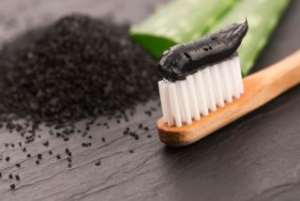
In recent times, there has been some kind of revolution in our cosmetic and pharmaceutical industries in Ghana, as it appears they have gradually accepted that it is time to return to Nature. Thus, the inclusion of mainly natural ingredients in the manufacture of many cosmetics and pharmaceuticals. Though it appears these industries have returned to Nature, they have done that using modern science. The likes of Ernest Chemists have formulated an all-natural cough mixture which tells us that the pharmaceutical industry is returning to Nature. Today, Charcoal infused products are the new trend in the world of wellness and cosmetics. Charcoal has become an essential ingredient in commercial face masks and body scrubs, while some people also swear by it for whitening their teeth. As a result, floss, mouthwash, toothpaste and even toothbrushes infused with activated charcoal that promise to whiten teeth and "detoxify" the mouth are also being manufactured.
Market Value of Charcoal
According to Prescient & Strategic Intelligence, (2019), Charcoal is Valued at $5,882.8 million. In 2018, the global charcoal market was projected to surpass $6,566.5 million by 2024, witnessing a CAGR of 1.9% between 2019 and 2024. Brazil is expected to lead the LATAM market, generating revenue of nearly $2.0 billion in 2024.

Fig 1. Global Charcoal Market. credit- Prescient & Strategic Intelligence, (2019)

Fig 2. Major Markets for Global Charcoal. credit- Prescient & Strategic Intelligence, (2019)
The Science of Activated Charcoal
A study by Juurlink, (2016) revealed that activated charcoal is a well-established treatment for some poisons and acute overdoses such as an overdose of pharmaceutical and over the counter medications.
Aside of this clinical use of activated charcoal, a 2017 review by Brooks et al., of charcoal-based toothpastes published in the Journal of the American Dental Association found that 96% of charcoal toothpastes claimed to have whitening benefits and 46% boasted of the ability to detoxify teeth. Most charcoal toothpaste brands don’t contain fluoride. There are also soaps being marketed which are infused with charcoal.
Another study by Jain et al., (1986) found that Activated charcoal pills or powders can be beneficial in alleviating uncomfortable gas and bloating. A similar study in that same year by Hulten et al., (1986) also demonstrates that when activated charcoal is taken at the same time as alcohol, it can significantly reduce blood alcohol concentrations. This is further affirmed by Princeton University’s First Aider’s Guide to Alcohol which indicates that activated charcoal is administered in some situations related to alcohol poisoning.
Hope, (2013) study also found that activated carbons, or charcoal, has effective binding capacity and is able to produce a significant reduction in mold absorption. Charcoal has also proven to be an effective agent for removing 90% of mold in a tested solution.
In water filtration, one study by Konno et al., (2008) found that activated carbon filters (activated charcoal), remove some fluoride.
For skin and body care, Chakravarthi et al., (2008) study demonstrates that activated charcoal infused products help reduce foul odors that are associated with blistering disorders and extensive skin loss. It can be used to reduce odor when combined with baking soda.
Activated charcoal products are also good for the digestive health. One study by Naka et al., (2001) found that “activated charcoal demonstrated lower binding capacity to the normal bacterial flora tested than that to E. coli O157:H7 strains.”
It is also an anti-aging agent. For instance, one study by Rafati-Rahimzadeh et al., (2014) found that it is able to remove organic and inorganic compounds from the body, and it tightly binds with metallic compounds. Finally, it fights cholesterol levels (Kuusisto et al.,1986). In this study, total cholesterol decreased by 25%, LDL cholesterol decreased by 41%, while HDL increased by 8% in just four weeks. Study participants took three doses of eight grams each for the period of the study.
In conclusion, we believe it is time to pay attention to our natural health industry in the era of 1D1F.
Prof. Raphael Nyarkotey Obu is the president of Nyarkotey college of Holistic Medicine. He also holds an MBA and is a Chartered Management Consultant in the natural health industry. Lawrencia Aggrey-Bluwey is an Assistant Lecturer with the Department of Health Administration and Education, University of Education, Winneba, and is currently a PhD student in Health Policy and Management at the University of Ghana Business School.




 Elisu By-election: "If you call yourself a man, boo Chairman Wontumi again" — Bo...
Elisu By-election: "If you call yourself a man, boo Chairman Wontumi again" — Bo...
 Fuel tanker driver escapes with his life after tanker goes up in flames near Suh...
Fuel tanker driver escapes with his life after tanker goes up in flames near Suh...
 Uniform change: ‘Blue and white are brighter colours’ — Kwasi Kwarteng explains ...
Uniform change: ‘Blue and white are brighter colours’ — Kwasi Kwarteng explains ...
 MoE not changing all public basic school uniforms but only newly built ones — Kw...
MoE not changing all public basic school uniforms but only newly built ones — Kw...
 We’re only painting new public basic schools blue and white – Dr. Adutwum clarif...
We’re only painting new public basic schools blue and white – Dr. Adutwum clarif...
 Bawumia has lost confidence in his own govt’s economic credentials – Beatrice An...
Bawumia has lost confidence in his own govt’s economic credentials – Beatrice An...
 I fought WW2 at age 16 – WO1 Hammond shares At Memoir Launch
I fought WW2 at age 16 – WO1 Hammond shares At Memoir Launch
 GRA-SML deal: Regardless of what benefits have been accrued, the contract was aw...
GRA-SML deal: Regardless of what benefits have been accrued, the contract was aw...
 April 26: Cedi sells at GHS13.75 to $1, GHS13.18 on BoG interbank
April 26: Cedi sells at GHS13.75 to $1, GHS13.18 on BoG interbank
 Champion, promote the interest of women if you become Vice President – Prof. Gya...
Champion, promote the interest of women if you become Vice President – Prof. Gya...
